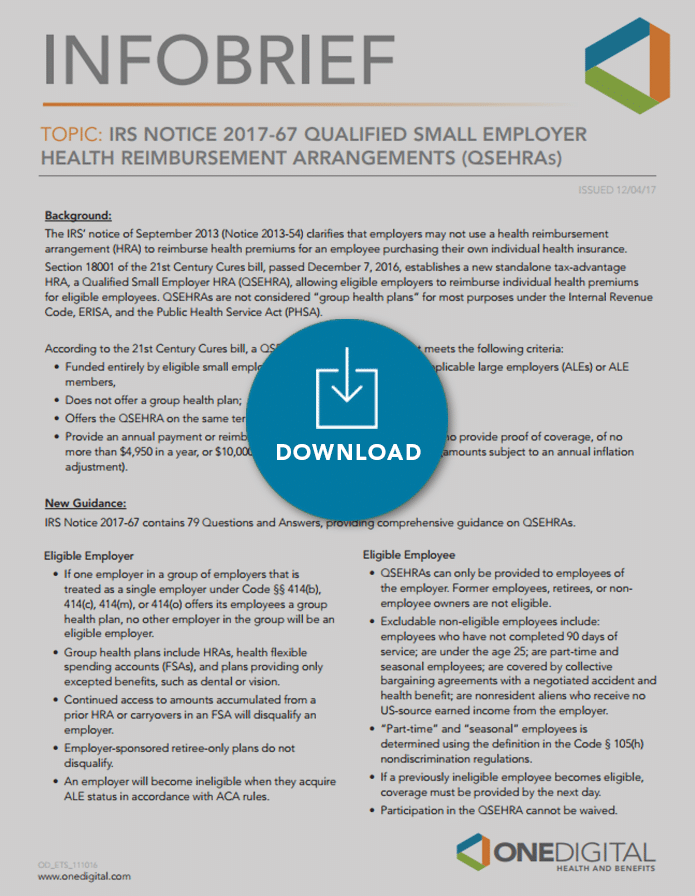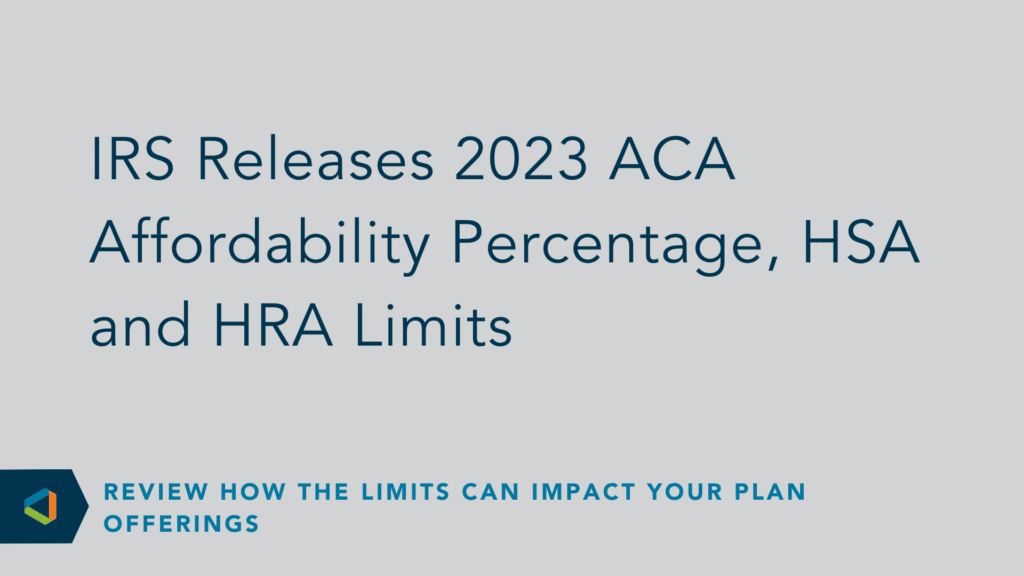The Internal Revenue Services (IRS) has issued guidance effective for plan years beginning on or after November 20, 2017, on qualified small employer health reimbursement arrangements (QSEHRAs) available to eligible small employers.
This will allow the employer to reimburse medical expenses including premiums for other health coverage. The introduction of QSEHRAs creates new opportunities for small employers; however they have a number of requirements and we’ve highlighted several below:
Eligible Employer
Only employers who are not applicable large employers (ALEs) can offer QSEHRAs.
On the date an employer becomes an ALE, even if occurring during the QSEHRA’s plan year, the employer is ineligible for the QSEHRA.
Additionally, offering a group health plan can disqualify an employer from offering QSEHRAs. Group health plans include Health Reimbursement Accounts (HRAs), health flexible spending accounts (FSAs), and plans providing only excepted benefits, such as dental or vision. Continued access to accumulated amounts in an HRA from previous years or carryovers in an FSA would also disqualify the employer. However, contributions to an employee’s health savings account (HSA) and employer-sponsored retiree-only plans do not disqualify the employer.
Eligible Employee
The QSEHRA must be provided to all eligible employees, defined as employees of the employer, and participation cannot be waived. Former employees, retirees, and non-employee owners are not eligible employees and cannot be provided a QSEHRA. However, the employer may exclude certain employees, if they meet the following criteria:
- Have not completed 90 days of service;
- are under the age 25;
- are part-time or seasonal employees;
- are covered by collective bargaining agreement with negotiated accident and health benefits;
- and are nonresident aliens with no US-source earned income.
Same Terms Requirement
The employer must operate the QSEHRA on a uniform and consistent basis with respect to all eligible employees. A permitted design includes one offering, the same dollar amount benefit whether self-only or family coverage is elected. A QSEHRA will not fail to meet this requirement because different eligible employees are reimbursed different amounts for different expenses for reimbursement.
However, if different types of medical expenses may be reimbursed for different categories of employees, the arrangement will fail.
Statutory Dollar Limits
The statutory dollar limit for 2018 is $5,050/$10,250 (self-only/family coverage), adjusted annually for inflation. If a QSEHRA allows carryover, the total permitted benefit, including the carryover balance, cannot exceed the applicable dollar limit. The employer must prorate the QSEHRA applicable dollar limit to reflect the actual number of months an eligible employee is provided the QSEHRA, non-calendar years, and short plan years.
Written Notice Requirement
The employer must provide written notice to eligible employees at least 90 days before the beginning of each year and for an employee who is eligible midyear, on the date the employee is first eligible to participate. For QSEHRAs provided during 2017 or 2018, the deadline for providing notice is the latter of February 19, 2018, or 90 days before the first day of the QSEHRA’s plan year. The guidance elaborates on the content of the notice and confirms the notice can be furnished electronically. Failure to provide notice results in a $50 per employee penalty, up to a maximum of $2,500 per calendar year per eligible employer.
Proof of Minimum Essential Coverage (MEC)
A QSEHRA may only provide reimbursements to an eligible employee after the employee provides proof of MEC. This initial proof, which the employee must provide at least annually, must show that the employee and (if different) the individual who incurred the expense, has Minimal Essential Coverage (MEC) for the month in which the expense was incurred. Following this initial proof, each new request for reimbursement requires the employee to attest that the employee and individual whose expense is being reimbursed continue to have MEC. Model attestations for both purposes are provided in the appendix.
Reimbursement
Premiums for coverage under the group health plan of a spouse’s employer are reimbursable but will be taxable to the extent premiums were paid on pre-tax basis. Cash-out of unused permitted benefits is not allowable; however a run-out period is allowable if it is provided on a uniform and consistent basis. Reimbursement of over-the-counter drugs purchased without a prescription is allowable, but also taxable to the eligible employee.
Reporting
Employers must report on Form W-2 the eligible employee’s permitted benefit, without regard to the amount of payments or reimbursements actually received. The notice provides seven Q&A’s explaining how to report, including non-calendar year plans, carryovers, midyear permitted benefit changes, and taxable reimbursements. Eligible employers are not required to provide Forms 1095-B, or Health Coverage, to its eligible employees. Note: QSEHRA benefits may affect eligibility for or reduce the amount of premium tax credits.
HSA Interaction
An eligible employer can contribute to its employees’ HSA and allow employees to make pre-tax HSA contributions through a cafeteria plan. However, employees may lose HSA eligibility if the QSEHRA’s coverage is not HSA-compatible (e.g., reimbursing any medical expenses, including cost sharing).
For questions regarding the Employer Shared Responsibility mandate or any of the information above, please reach out to your OneDigital representative today.





